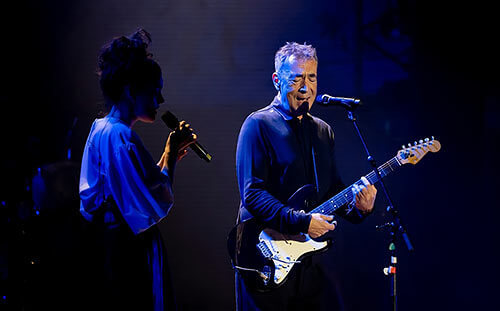ZEITEN & ZEICHEN
Zeltspektakel in Winterbach: Hubert von Goisern gets people out of their seats
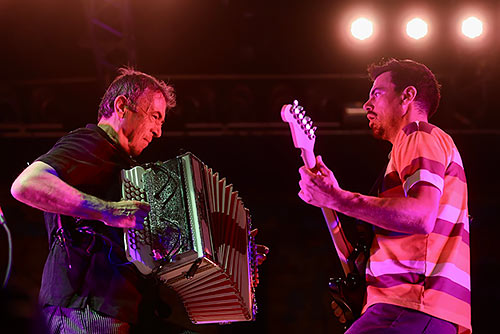
Day seven of the Zeltspektakel. Penultimate concert. The many volunteer workers from Kulturinitiative Rock are pretty much dead on their feet, Steffen Claus confirmed as he welcomed people to the long since sold out seated concert from Hubert von Goisern. By contrast, he and his young four-member band were well-rested. They'd had a day off from their Zeiten & Zeichen Tour, the first since Covid. So they turned up a day early and chilled out in the lovingly furnished backstage area, with a view of the Weinberg vineyards and forest. And they sparkled with exuberant joy throughout their concert, which lasted more than two hours – and was enthusiastically received by the audience.
The tale of the shark, told with ultra-nonchalant Austrian charm
The beer garden outside was full of people before the concert began. It was warm, but there was a pleasant breeze. And then came Goisern. "Greetings! Hello Winterbach!" to an odd waltz, he himself on the accordion, then a driving rock number with an energy-splitting duet between the accordion and guitar, the band turned up the heat in the tent a few more degrees.
Only to then bring the temperature down a little through the self-suggestion of a couple of songs. The artist, who will turn 70 this year, talked about his many trips to Greenland and gave the murder ballad about the polar bear from Greenland a Caribbean sound, before performing the bubbling, heart-rending tale about the Greenland shark, deep in the sea, and his search for a partner. Illustrated by a mournful pining for courtship on von Goisern's cornet. Really hot alpine humour to cool down to, performed with a certain kind of ultra-nonchalant Austrian charm.
And then came the older songs, like Heast as nit (wie die Zeit vergeht) and Weit, weit weg with wafting stage fog, almost all-consumingly beautiful, as two of the three encores that really moved the audience.
The greatest thrill came just before though, with the last songs of the official set: an unleashed alpine polka rock song, which had everyone up and out of their seats, dancing crazily in the narrow aisles. Brenna tuats guat was the name of the rousing hellfire dance and it drove the temperatures sky high.
Thunderous applause. A grateful audience, and a few gratefully overwhelmed musicians, who had clearly enjoyed the Zeltspektakel.
Hubert von Goisern live in Karlsruhe

More photos at www.facebook.com
Hubert von Goisern has his finger on the pulse with his new album
It's a wild ride along the knife's edge, just as you would hope for from the concerts of alpine rocker Hubert von Goisern. He played two nights at the sold out Tollhaus.
"You've been there since day one", Hubert von Goisern says to his audience. It's difficult to say whether he's referring to the fact that his fans, who had bought tickets two years ago, had to put up with several postponements in order to hear the album played live at last. Or whether the 69-year-old perhaps means the many grey manes seated before him. It's rare that you're among the youngest in the audience when you're in your mid-50s. And it's just as unusual to see such elegant ladies and gentlemen so excited.
Goisern, whose real name is Hubert Achleitner, produced his new album Zeiten & Zeichen in 2019, before the coronavirus, the war and the energy crisis. And you might agree with him that the songs are now almost prophetic, being right on the pulse three years later. His song Sünder in particular: out of Nina Simone's famous up-tempo song Sinnerman, Goisern has made a farewell to the harried disorientation of our time that threatens to ruin us all. "He sog amoi wohi wern ma rennen" (Hey, come on tell me, where are we heading), it goes. And: "Koana woaß wonn wieda oana durchdrahnt" (Nobody knows when the next one will go crazy).
Shadowy, poetic lyrics
With concise and pithy lyrics Goisern alludes to the storming of the Capitol and Fridays for Future: "Sogor de Kinder zoagn schu auf de Sünder" (Even the children are pointing at the sinners). The lyrics manage to refrain from employing the kind of pathos that is common among do-gooders which is so difficult to bear and tends to stand in the way of identification rather than promote it. And he lets rip musically with driving rock passages in which his band are given the space to show what they're made of. In Sünder in particular, Maria Moling fires up the xylophone, and Severin Trogbacher's distorted guitar echoes the noise of war. As a multi-instrumentalist, the band leader also uses a wealth of sounds, including a quirky interlude on an animal horn in a song about poaching, Wildschütz Rap.
Despite all the joy in yodelling, atmospheric harmony singing and swing of the accordion: it is an autumnal album with shadowy, poetic lyrics. The Novemberpferde (November Horses) that dream of snow seem to set the fundamental mood. Even an icon of unshakeable optimism gets a little bit rattled by the song Freunde, das Leben ist lebenswert from Franz Lehár's operetta Giuditta, in which opera singer Andreas Schager's part is included via playback. It's a strong contrast when, in the characteristic style of Falco's Amadeus rap, Goisern shares the fate of librettist Fritz Löhner, who was deported as a Jew from Vienna – without Lehár stepping in for him – and murdered in Auschwitz. The last line in particular hits you in the heart: "Der Mann, der in diesen schicksalhaften Jahren der Welt so schöne Lieder gab, hat nie erfahren, dass seine Töchter Eva und Lotti samt seiner Frau Helene schon zuvor himmelwärts geflogen sind, wie brennende Schwäne" (The man, who in these fateful years had given the world such beautiful songs, never learned that his daughters Eva and Lotti, together with his wife Helene, had already flown to heaven ahead of him like burning swans).
Even fake news can be set to music
The signs of the times are very gloomy in Goisern's anti-right-wing song Brauner Reiter too, in which he murmurs about the Holy Grail with a rolled "r" and an emotionless, threatening Rammstein-style voice. Other songs are more conciliatory, as the melancholy is spiced with the blues. The mischievous ballad Grönlandhai (Greenland shark) is a monument to slowing down, dedicated to an animal that lives to 500 years old, because it bobs along in the dark depths of the ocean at just one metre per second and dreams of a female shark in Hawaii. The polar bear has a great time, in spite of his "oh so threatened paw", when he can indulge in his desire for meat in the Caribbean-style swinging Eiweiß. And you can even set fake news to catchy music: "A Blau ist do koa Gelb und Rot nit Kräan" (Blue isn't yellow and red isn't green) Goisern elegiacally sings in Meiner Seel (Upon My Soul).
The stories that Goisern tells about his songs are wonderful. For example, how he dedicated Jodler für Willi (Yodel for Willi) to his later brother-in-law, whose combative nature he really appreciated: the researcher Willi Foissner, who named a protozoa after Goisern. Or how he came to set Goethe's Rastlose Liebe (Restless Love) to music, calling it Glück ohne Ruh (Joy Without Peace). A film director friend of his had encouraged him to do so because he didn't like Schubert's song - but in the end didn't like Goisern's either.
When the squeezebox gets things going
Before the two-and-a-half-hour concert draws to a close, the band really heats up again with snappy numbers, as they had done previously with the techno song El Ektro, in which Goisern postulates "Ich will nicht tanzen" (I don't want to dance) with a distorted computer voice and other Kraftwerk borrowings – of course achieving exactly the opposite. Finally, the audience are torn from their seats when the squeezebox gets things going with perhaps one of his most well-known songs Brenna tuats guat.
17 songs are gathered together on Zeiten und Zeichen. But for a couple of seconds, Goisern says he almost filled the capacity of a CD. All in all, the mix of styles, the constant changing of worlds of sound with the many borrowed stylings, seem a little thrown together. But what you remember at the end of the evening are the strong numbers and on the way home there is the echo of an apocalyptic atmosphere amid violent flashing lightning.
Hubert von Goisern live beim Tollwood Festival
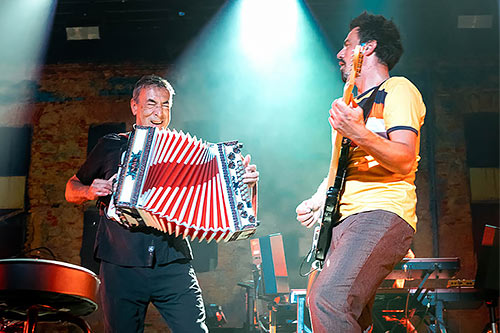
Mehr Fotos auf www.nachrichten-muenchen.com
How the shark and the trumpet met
Hubert von Goisern thrills the audience at the opening of Sommer im Park festival
Vellmar - A welcome in three-four time melancholy. An accordion catches its breath with a sluggish rhythm and strikes up a waltz. Up on the blood-red stage, Hubert von Goisern opens the concert with an intricate twist on the classic dance style. Flanked by the booming bass, this three-time beat, which suddenly doesn't feel as familiar, sways and sways until it becomes an acoustic threat and finally grows into a psychedelic thunderstorm of sound. It comes down on the audience at the Sommer im Park festival like a warning against relying too heavily on our certainties and traditions.
It is a powerful start to an impressive two-and-a-half-hour concert with a great band, which garnered euphoric applause in the almost sold out festival tent in Vellmar for this season's kickoff. The 69-year-old Austrian, real name Hubert Achleitner, constantly switches between different sound worlds and instruments. He shifts between a celebration of folk melodies, monotone techno stomping, and bombastic sound with an extra helping of reverb. He can sing nonchalantly like Baloo the Bear when he's being cosy, or solemnly like Rammstein frontman Till Lindemann, and he can make his harmonica sound like shattering glass. After that, Hubert von Goisern returns to singing tender ballads, accompanied only by a guitar or the piano. A charismatic sorcerer of sound, one who knows how to tell stories, such as the one about the secretive Greenland shark, who can live to 500 years thanks to his extreme lethargy. Did we hear sea sounds mixed into his trumpet solo? He learned about the Methuselah of the sea at music workshops for young Inuits in Greenland. The message: you have to know your roots to discover who you are.
Apropos of that: Hubert von Goisern also visited the Documenta Fifteen. Experiencing how people all over the world create art – beautiful and full of poetry – in the face of exploitation and catastrophe "touched him deeply".
One of the evening's highlights was the heavyweight song Freunde … das Leben ist lebenswert. It sheds light on the fate of writer Fritz Löhner-Beda, who created works such as Das Land des Lächelns with operetta star Franz Lehár. While Léhar opportunistically remained silent in the face of the anti-Jewish pogroms in Nazi Austria, his friend was killed in the Auschwitz concentration camp. "When it was all over, Franz protested that he had known nothing / About his friends' dance of death".
The yodels that Hubert von Goisern strikes up from time to time convince the audience that this traditional signal call may even be able to overcome the limitations of the earthly world. Words of farewell: "Look after each other".
Hubert von Goisern live in Koblenz
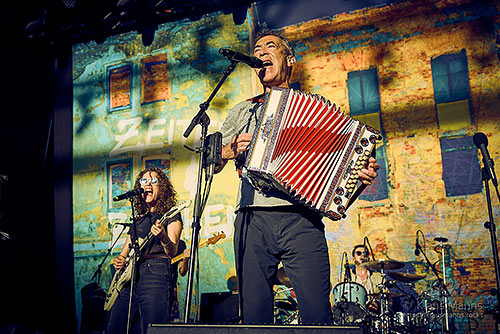
More photos at www.facebook.com
Forget the world around you with Hubert von Goisern
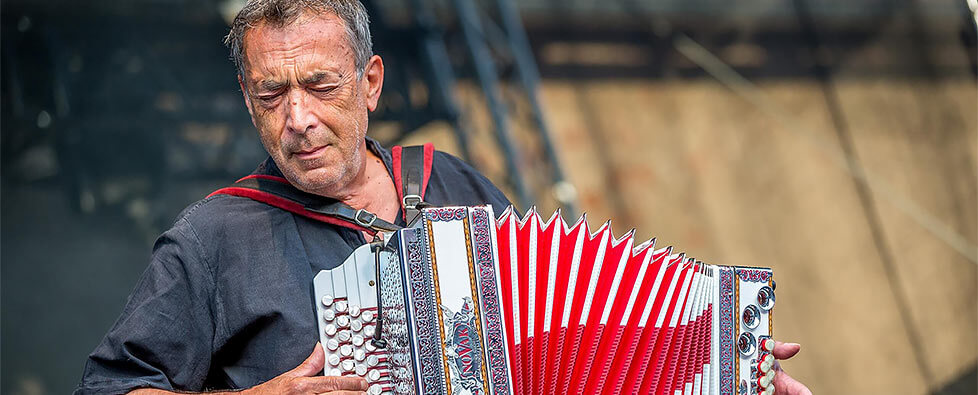
The Austrian singer-songwriter captivates 900 fans at Gut Wöllried with rhythmic journeys and his own brand of humour. And he explains what happens when he listens to his wife.
Hubert von Goisern is said to have once remarked: "I translate music into words." To correct him: he translates music into poetry. The crowd of 900 at Gut Wöllried hangs on the artist's every word, keenly listening to him chat between the songs – as well as to his enigmatic lyrics. Hubert von Goisern, as the 69-year-old from the little town of Goisern on Lake Hallstatt in the Salzkammergut is known, is an individual, special and yet a singer-songwriter in the classic sense. He's got something to say.
He's also someone who provokes, though no longer as aggressively as 30, 35 years ago in the time of the Alpinkatzen. No, now he does it almost lovingly. Only he could come up with the idea of starting the set with 70s beats reminiscent of Donna Summer (I Feel Love) and the song El Ektro. "Anyone who hasn't prepared for the concert is going to need a while," von Goisern says almost apologetically in reference to the hectic buzz of his current album Zeiten & Zeichen. It's simply part of this multifaceted musician, who doesn't shy away from joining ethnic rhythms to alpine rock. He promptly grounds his fans in Rottendorf with the latter (A Tag wie heut) afterwards.
Reverb only mars the evening a little
It's a warm evening in a dreamy setting. It's a bit of a shame that the high class show from the five-member band at the back is a little impaired by the reverberation of the rear building; but there came the point when it was barely noticeable, because the man at the front managed to make everyone forget everything around them for two hours. Two hours – von Goisern, who usually plays for an additional hour, apologises for this too, in his way: "You would have perhaps been better off going somewhere else".
No, no, the 900-strong audience at the Wöllried estate is in good hands. They learn that his wife thought the lyrics of Dunkelblau were wonderful, but not the music. "I listened to her and rewrote the lyrics." They also learn that von Goisern can play darker rock songs as well (Brauner Reiter) – some of the more mature audience members wince a little. And feel at home again with the prowling jazz number Future Memories. The Austrian wrote Jodler für Willi for a friend with whom he could argue wonderfully – "until he dropped dead two years ago and didn't rise again".
A musical and thematic rollercoaster ride
Humour here and merciless processing of history and contemporary evil there. Von Goisern tells of the Inuit who flippantly comment on global warming (well, we're waiting) and in Freunde sings the life history of Bedrich Löwy. The Jewish writer known as Fritz Löhner-Beda was a good friend of composer Franz Lehár - who grew to be a darling of the Nazi authorities and failed to stand by him when he was deported to the Auschwitz concentration camp and executed there in 1942.
It's both a musical and thematical rollercoaster ride. There's rapping and there's unbridled dancing to the party number Brenna tuat's guat. It turns poetic again in the encores: Juchitzer – the most progressive yodel in the history of folk music. Weit, weit weg, caresses the soul. Heast as nit? – the song of praise to the passage of time. And then the alpine rebel defies the curfew, crouches at the edge of the stage with his guitar ("please don't tell anyone") and with Dunkelrot plays the version of Dunkelblau for which his wife hadn't liked the music - wonderful.
Race to the top, and into the abyss
Bremen. Hubert von Goisern is a translator. The Austrian is a composer, lyricist and musician, and, more recently, a novelist, but his most prominent feature is the ability to carry traditions into the present, with progressive radicalness and free from any kind of reactionary tendencies. He found fame a good three decades ago with his alpine rock, with which he effectively moved the folk music of his homeland towards the left wing. Since then, he has repeatedly embraced various influences and yet has remained tightly connected to his roots. His musical world travels have taken him up and down the Danube, to Africa and Greenland – and now to the Metropol Theater in Bremen.
To be clear: his magnificent show deserved more than the half-empty hall. A degree of blame probably lay with a certain panic rocker from the Elbe, who was appearing at the same time a few hundred metres away, but it was undeniably also the result of a pandemic-related reluctance of the audience. It didn't challenge the 69-year-old multi-instrumentalist and his perfectly rehearsed band. They played a more than two-and-a-half-hour programme that mostly presented the current album, Zeiten & Zeichen, in the first part and then returned to a variety of the most beloved older pieces, even though the section could only ever be incomplete in view of his extensive body of work.
Operetta, rap and spiritual
It's often the case that the – certainly subjective – highlights of any concert are the pieces with which the listener has had a long-term connection. The sentimentality of such moments resonates in the songs Weit, weit weg or Heast as nit ("Die Jungen san alt wordn, und die Altn san g'storbn" – "The young have grown old, and the old have died"). But von Goisern's constant curiosity always leads to new surprises. And thus with Freunde, the first track on the new album, he has made a track that is a crossover of classic, hip hop and rock recitative. Built around a sample of the most fervent of all operetta melodies, Freunde, das Leben ist lebenswert from Giuditta, the piece tells the story of Fritz Löhner-Beda, who wrote the libretto to the music by Franz Lehár. Born Bedrich Löwy, he was persecuted as a Jew and ultimately murdered in Auschwitz, while Lehár dedicated the work to Mussolini and socialised with high-ranking German Nazis. It is said, however, that he never stood up for his friend Fritz.
Hubert von Goisern lets the refrain, which in this context reveals itself as the height of cynicism, collide with Löwy's life story and at the same time takes on the rap lines live – which Dame contributed in the studio. It's an impressive reworking of history that leads us from musical peaks into human abysses without a trace of moralising. A no less intense moment leads back into history and retells it alongside the music: Sünder is a cover of the legendary Sinnermann, a spiritual that found notable recognition in the ten-minute version by Nina Simone from 1965. Simone turned it into a hypnotic anthem of emancipation, which was later reworked as a reggae tune by Peter Tosh, and as a sombre country song by 16 Horsepower. When it comes to von Goisern, familiar folk music aspects are added, closing an intercultural circle across the continents.
Goosebump moments
This motion defines his entire repertoire and becomes clear in the extensive encore section, which swings wildly back and forth between exuberance and melancholy. The band performs a dance around the outstanding Severin Trogbacher (guitar, violin) in Brenna tuats guat, while in the quiet passages they employ decisive tenderness. Maria Moling in particular, a former long-term member of the Ladin trio Ganes, shines as the second singer alongside the band leader. The fact that they both get along well as yodellers too makes for the unique goosebump moments for which Hubert von Goisern has been known for decades. In fact, it is thanks to him that this tradition found its way into popular music and does not seem at all foreign. Everything is in flux on this evening too, cultures connect as a matter of course and von Goisern, the bridge builder, allows them to shine with his powerful sensitivity.
Day one with alpine rock in Kaiserslautern's Kammgarn
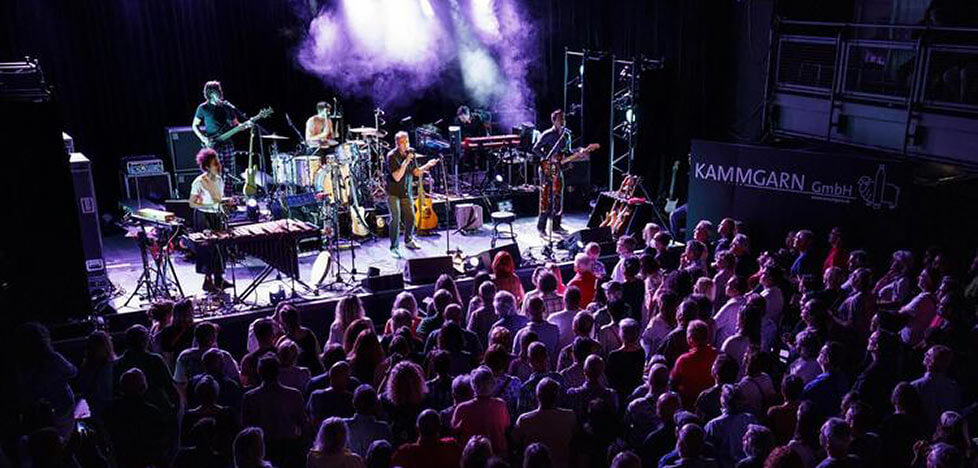
For three days, world music is king in Kammgarn, Kaiserslautern's culture centre. Austrian Hubert von Goisern presented the opening night – with some surprises.
At the start of the festival on Tuesday evening, the alpine rocker Hubert von Goisern demonstrated that, in spite of his 69 years, he has lost none of his musical brilliance and ideas. The Austrian surprised and challenged the more than 700-strong crowd with his current album Zeiten & Zeichen for two-and-a-half hours – without an interval.
Kammgarn was once again the musical centre of the region for a long evening. Number plates with KUS, KIB, MZ, SüW, LU, PS, SP, SB and KA were spotted in the car park, proving the popularity of both the culture centre and Hubert von Goisern, who mixed traditional homeland tunes with world music, rock, reggae and even experimental music. This fine figure of a man with the distinctive face and the even more distinctive voice – he'll be 70 in the autumn - stood on stage and enjoyed the frenetic applause that greeted him. You could feel it: he hungers for the live atmosphere. What followed in the next 180 minutes was simply magnificent.
Bizarre guitars
His virtuoso yodel from the opener, Kiahsuacher, initially seemed to meet the expectations of some alpine tourists. The song Gamstod also seemed to fulfil their hopes, beginning in comfortable three-four time. However, this folk tune was quickly broken up with bizarre, scratchy guitar riffs (Severin Trogbacher) and cathedral-sized drum rolls, giving the impression of rockets and aircraft bombs. Thoughts of the war in Ukraine were not far from one's mind. Hubert von Goisern wasn't at a loss for political statements in the song Brauner Reiter either. The theme of the song was exactly what intuitive associations of the title might suggest: the misfortune that befalls a society that gives free rein to right-wing currents.
The master packs all this into a hellish tropical thunderstorm with hard guitar riffs and a stomping drum rhythm (Alex Pohn). Similarly harrowing is the song Freunde, in which von Goisern tells the story of Franz Lehàr's composer and librettist, Fritz Löhner Beda, who was tortured by the Nazis in Dachau in 1938 and murdered in Auschwitz in 1942. "There are stories", von Goisern says, "of incomprehensibility and human abysses, but they're stories that belong to the history of mankind and are a part of us." With pounding drums, virtuoso percussion and hard-hitting rock, the band broke through the bliss of the operetta, while the master stirred up emotions with "Friends, life is beautiful" in a rough, heroic tenor voice. It made you choke up as you listened.
The vegan polar bear
In the interplay between ballads and hard rock, between melancholy and irony, lay many surprising moments. The musician also had humour. Example: Eiweiß. This song is about a polar bear who would love to be a vegan. "Er wird amoi Tibeter, aber irgendwann später" ("He'd like to become a Tibetan, some time in the future) the song goes. But until then he like meat and blood, because he needs protein – "at any price". Colourations on the guitar and keyboard (Alex Trebo) and electronic gimmicks made clear that folk music can get by without any folksy stereotypes. The audience of 700 reached their hands high and clapped rhythmically with the not-so-cool polar bear.
The audience was offered further amusement with the Grönlandhai (Greenland Shark), 500 years old and the last of his kind, who dreams of a holiday in Hawaii and a hot shark wife. For this, the multi-instrumentalist not only intoned with a deep voice, but also surprised with a delicate sound on the muted trumpet. It's amazing how whole mountains of emotions can be moved with minimal means and a very subtly swinging band. Last but not least, the alpine rocker convinced with Dunkelrot and Dunkelblau, two of the most beautiful love songs, one of which the master performed coolly and aloofly, and the other with glowing, warming closeness. The stirring electric guitar, von Goisern's virtuoso harmonica playing and Maria's siren-like voice and her brilliant percussion plunged the songs into an ocean of sound.
Almost an hour of encores
Finally, the fantastic band went insane and acted like the horsemen of the apocalypse. However, the artist communicated his central message with A Tag wie heut, a forthright rock number without much fuss, but with a strong beat: "No matter what skin colour, religion or political attitude we have, we're ultimately all the same!" A declaration that couldn't be more appropriate and timely. Enthusiastic ovations and almost an hour of seven encores. Among them Weit weit weg and Brenna tuats guat.
Hubert von Goisern live in Kaiserslautern
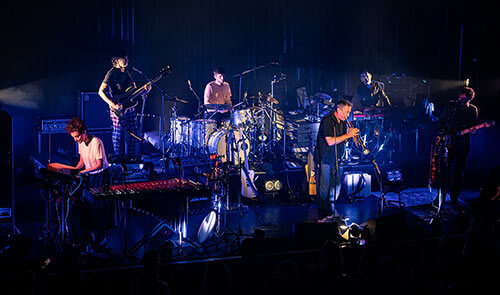
More photos at www.facebook.com
"I get very nervous no matter where I play"
BAD ISCHL. After an unexpectedly long break from touring, Hubert von Goisern is coming to the Bad Ischl Kaiserpark with his new album "Zeiten & Zeichen". Tips spoke to the singer-songwriter and world musician: about the connection between homeland and language, about his new album and about what he has personally learned from the time of the coronavirus.
You've been playing a lot in Germany recently. Is there a difference for you when giving a concert that's almost "at home"?
I actually get very nervous no matter where I play. When I play in central Germany, in Oldenburg for example, it is a different playing field for me of course. I'm an exotic foreigner. Certain turns of phrase – not just the dialect – are different there, there's a different way of expressing yourself. So being able to speak dialect at a concert is very appealing. The folk music things come to mind more readily when there are lots of people in the audience who also know yodels, for example. But I'm always nervous, hoping that it goes well. It's a bit different in the Salzkammergut – there are more friends in the audience, people you know.
You took a break from the stage in 2016 to turn to writing, then the tour for the new album you had planned for the start of 2020 fell victim to the pandemic. What was it like to be back on stage after such a long time?
I once took a seven-year break from the stage – from the end of the Alpinkatzen up to 2001. It doesn't matter how long tour breaks are: it's always a new start, and it's nerve-wracking. This time in particular: there are six of us on stage – and at the start of the tour four of the musicians went down with Covid, one by one, leaving only two of us at the first concert. Then another musician joined us. It was unbelievably stressful: how can you take what you've planned and put it on stage in a completely reduced form? It was a baptism of fire.
After a start like that, there's probably not much that can shock you.
It was pure stress, it was about survival. But it was also an eye-opener – to realise that it can work. Perhaps the pandemic has forced us to accept the fact that not everything has to be perfect. Like with cooking: when you're making spaghetti and you don't have everything you usually use at home – then you can always make something from what you have. Humility – we've learned that in the pandemic too. And there's a different kind of appeal in mobilising something you didn't know you had.
Your new album is called Zeiten & Zeichen. Right at the start stands Freunde, das Leben ist lebenswert, a piece about Fritz Löhner-Beda, who had a close connection to Bad Ischl and was murdered in a concentration camp during the Nazi-era. What does the song mean to you – and will we hear it in Bad Ischl?
That's my intention. I've played it at every concert since the band has been back in the full lineup. It's still an unbelievable act of will, a great effort to tell this story – it chokes you up to sing and rap it. But I've always managed it so far, and I'll sing it in Bad Ischl too.
In general your new album is very diverse – from musing about human stupidity to a swinging song about a sombrero-wearing, protein-devouring polar bear. How does that all fit together?
It's all very true-to-life. If you just take one day: we experience so many different things, we meet so many different people, every day is so different. I liked the idea of allowing this kind of variety on my album too, of saying yes to the things that came along. A second reason was certainly that I made the album after a long break from music – I had been working on my novel. So I wasn't within a particular musical style and just sketched out my ideas on a blank piece of paper. And after such a long time, there were simply lots of them. There were about 40 ideas – 15 then survived from those and another two came along later.
We'll probably hear some old hits on stage as well – what can concertgoers look forward to?
It changes from concert to concert. Of course, we're playing the songs from the new album, that alone takes two hours – longer with presenting them. After two and a half hours people are at the end of their attention span. So I take out two or three songs at most that I don't play. And we have lots of old pieces in the programme, from Brenna tuats guat to the Afrika Ouvertüre. Exactly what we play is a bit different at each concert and I decide when I'm there, based on instinct.
Hubert von Goisern in Künzelsau: a visit from the analogue world
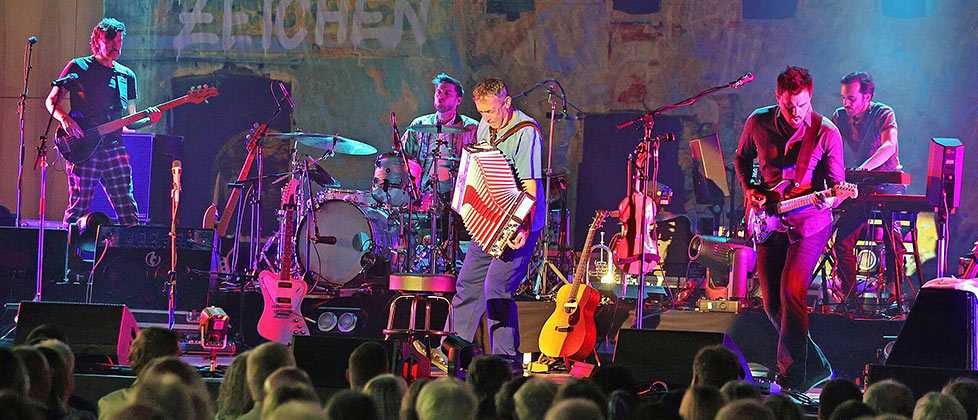
Hubert von Goisern and his band delight 1900 fans at the Carmen Würth Forum
Hubert von Goisern hasn't given a concert in almost six years. Instead, he has penned his first novel Flüchtig and worked on an album, which is filled to the brim with everything that fascinates him. Zeiten & Zeichen turned into an overwhelming record, 75 minutes long, a concept album – a dying breed in the age of streaming and immediate gratification. Attending a Hubert von Goisern concert is almost like a little trip back to the analogue 90s, when he made his breakthrough with the album Aufgeigen statt niederschiassen.
Frenetic welcoming cheers for Hubert von Goisern
This fine figure of a man with the striking face – he'll be 70 in the autumn – stands on stage enjoying the frenetic welcoming cheers from the 1900-strong crowd in the hall. The audience, who have aged alongside him, are hungry for his music, and he is hungry for the atmosphere of playing live. He's wearing a T-shirt with the two-line inscription "ANA LOG" and gives his own welcome with a yodel accompanied by the accordion.
Hubert von Goisern: a musician who knows what he wants
What follows in the next two-and-a-half hours is quite simply magnificent: a concert with hip hop and opera, rap and Rammstein, electro pop and folklore, classic rock and song material by Goethe songs. Hubert von Goisern didn't stop after Koa Hiatamadl and continued to expand his repertoire according to his own taste. A musician who knows what he wants – and does it.
In Künzelsau the 69-year-old plays his way through Zeiten & Zeichen, released in August 2020, with his excellent five-member band. Between songs he often ruminates in his Salzkammergut dialect on time, the synchronicity of events and the intermediate worlds he experiences during the artistic process. All very understated, like the stage backdrop, on which one might perceive the Ukrainian colours.
Almost like Udo Jürgens
He also speaks out against vaccination sceptics and conspiracy theorists, factually and calmly, not bluntly and provocatively. With Brauner Reiter, a dark piece stomps along in the guise of Rammstein. Right after that comes the contrast: "Sometimes time hides from me", von Goisern sings in Future Memories, sounding a little like Udo Jürgens – with a trumpet.
In Glück ohne Ruh, the charismatic man arranges Rastlose Liebe by Goethe and Franz Schubert. He puts that next to the techno rhythm of El Ektro with robotic vocals and quotations from the techno pioneer band Deutsch Amerikanische Freundschaft (DAF). The straightforward rock song A Tag wie heut, which swears solidarity across all boundaries, forms the flank to von Goisern's love of Greenland. While Eiweiß speeds through as a humorous interlude, Grönlandhai is his ode to slowing down. Guided by the motto of "mouth open, eyes closed", the animal reaches the Biblical age of up to 400 years.
Nobody knows when the next one will go off the rails
Among the highlights is Freunde, a nightmarish song somewhere between rap and operetta, with speech song à la Falco, about Lehár librettist Löhner-Beda, who was killed by the Nazis. Sünder, a cover of the gospel classic Sinnerman by Nina Simone, by contrast has almost prophetic qualities. To a wafting vibraphone, jazz groove and buzzing violin, von Goisern sings "Koana woaß, wann wieder oana durchdrah't, koana woaß, wie lang's die Welt no geb'n wird" ("Nobody knows when the next one will of off the rails, nobody knows how much longer the world will exist"). Guitarist Severin Trogbacher shines here with an opulent solo. Trogbacher, who also plays violin, and multi-instrumentalist Maria Molin are the stand-out members of the band.
After all these great moments follows a 45-minute encore with the celebrated hit Brenna tuats guat and the 30-year-old songs of longing, Weit, weit weg and Heast as nit?. Wonderful.
Hubert von Goisern performs at the Bigbox Kempten
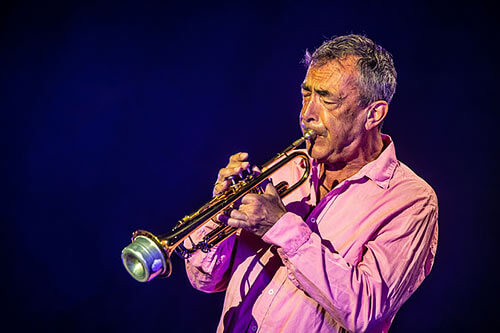
More Fotos at www.allgaeuer-zeitung.de
On tour with "Zeiten & Zeichen"

Hubert von Goisern: Live in Cologne - 6 April 2022
Photo: © Marcus Schlagenhaufer
Hubert von Goisern: Live in Leipzig - 8 April 2022
Photo: © Marcus Schlagenhaufer
Hubert von Goisern: Live in Graz - 12 April 2022
Photo: © Marcus Schlagenhaufer
Hubert von Goisern: Live in Graz - 12 April 2022
Photo: © Marcus Schlagenhaufer
Hubert von Goisern: Live in Vienna - 13 April 2022
Photo: © Marcus Schlagenhaufer
Hubert von Goisern: Live in Vienna - 13 April 2022
Photo: © Marcus Schlagenhaufer
Hubert von Goisern: Live in Vienna - 13 April 2022
Photo: © Marcus Schlagenhaufer
Hubert von Goisern: Live in Vienna - 13 April 2022
Photo: © Marcus SchlagenhauferHubert von Goisern triumphs in Vienna
He reconciles urban and rural tones:
Hubert von Goisern thrilled his audience at the Konzerthaus with his very own form of world music.
After a six-year break partly imposed by Covid-19, Hubert von Goisern was finally back on a Viennese stage. Finally, because he himself could barely stand the abstinence any longer; and finally, because this gentle renegade does something that only very few, such as Sepp Forcher, have been able to do: that is, bridge the divide between urban and rural ways of thinking and frames of mind, without making false compromises.
He began with a highly nuanced yodel called Kiasucher, followed by a delicate rendering on trumpet. When a city dweller hears a hollarädülliö, their fight or flight reflex tends to kick in. Similar syllabic singing is cultivated in Africa, Melanesia, and Siberia too though. And von Goisern has always been an internationalist. He has travelled the Danube and Tibet, Africa and Greenland with curious eyes. And brought fresh melodies and insights home with him from distant lands. The Greenland Shark from the deep Arctic made a guest appearance on this evening, and the November Horses trotted by from the foot of the mountains.
Musical textures are not set in stone for von Goisern, so there is always space for live improvisation. This results in a seductive airiness of the music, which draws your concentration firmly to the ambiguous lyrics, such as the somewhat Dadaistic anti-escapism song El Ektro. Sünder, which was released in 2020, has almost visionary qualities. "Koana woaß wia long's die Welt nu gebn wird" (Nobody knows how long the world will last), he sang, referring to state leaders who could go nuts at any moment.
Freunde was a very special song, in which Goisern pithily told the tragic life story of Fritz Löhner-Beda in an unorthodox form of speech song. Löhner-Beda, who penned the lyrics for such schlagers as In der Bar zum Krokodil and Benjamin, ich hab nichts anzuziehn, was also an operetta librettist. He worked together with Franz Lehár on Land des Lächelns and Giuditta. With bitter irony, the Goisern quotes "Freunde, das Leben ist lebenswert" (Friends, life is worth living) from the latter. Löhner-Beda's life famously ended in a concentration camp, where he wrote his last song together with the similarly interned Hermann Leopoldi, who survived: the Buchenwaldlied (Buchenwald Song).
Out of the clever mixture of yodels, rock and world music rose softly pulsating meditations such as Future Memories and Meiner Seel. That was real soul. The greatest of devotion prevailed with the classic Heast as nit too: music for Salzkammergut nostalgia at its finest.
A colourful mix of stories: Hubert von Goisern at the Konzerthaus
The musician presents his current album "Zeiten & Zeichen"
This man has many a thing to say: when Hubert von Goisern goes on stage, you need to be ready for anything. Such as concerts with a minimal line-up, as he recently gave at the start of the tour, due to multiple cases of covid in the band. Or putting everything from rock songs to soulful yodels into his shows. This teller of many stories still moves through the styles with unbounded curiosity, as he did on Wednesday at the Konzerthaus in Vienna.
The good news first: "They're all back again!", announced the 69-year-old singer, multi-instrumentalist, composer and, as of two years ago, author (flüchtig) at the start of the two-and-a-half hour evening. It was different two weeks ago, when four of his five band members caught covid right at the start of the tour. But he never gave a thought to cancelling. "My wife always says: you're so stubborn! But it helps in such cases", he smiled.
But now everything's back to normal anyway. Meaning: the Goiserer played his way through his album Zeiten & Zeichen, which was released in 2020 and still sounds current, with an exceptionally playful band. And he pulled out all the stops: from the bluesy-stomping Dunkelblau (Königin der Nacht), or the vociferous Sinnerman cover Sünder, to his typical deconstruction of traditional music in Gamstod; everything you could have expected and hoped for was included.
The fact that von Goisern really went out on a limb for this album is attested to by Brauner Reiter, reminiscent of Rammstein, and Freunde, the exuberant number situated somewhere between rap and operetta, which he wrote about the librettist Fritz Löhner-Beda, who was murdered at the hands of the Nazis. Heavy stuff, but instantly broken up by humorous interludes like Eiweiß and Grönlandhai. These are not the only instances where von Goisern flirts with schlager-like sounds, but he always embeds them in an open universe of music in his typical style. There are edgy sounds too, as El Ektro turns the Konzerthaus into a disco with beats and vocal effects.
Of course, with all these stylistic extravaganzas, he benefited from a band that he could fully rely on and that blindly followed the master, who was often deeply immersed in his music with his eyes closed. Of course, it also helped that the sound, which was a little unbalanced at the beginning, gained pressure and transparency from song to song, allowing singer and multi-instrumentalist Maria Moling to become more and more present. Ultimately, a true collaboration could be felt, as von Goisern and his colleagues passed each other the ball, took up and continued phrases and melodies, and reinterpreted them, emphasising the added value of a live experience.
And of course: the stories. Time and again there were insights into the development of the songs. Von Goisern talked about titles and lyrics, which in retrospect turned out to be downright prophetic, or turned into a naturalist in the face of the (barely existent) flora and (sometimes threatening) fauna of Greenland. Things turned political too of course, although the artist is no fan of finger-wagging or bold declarations. One thing is certainly clear for those who have travelled a lot: everyone, no matter where in the world, has "the same dreams, wishes and needs".
At the end there were big cheers and a standing ovation for an intense set that demanded a lot from the audience, but also met understandable expectations with big pieces like Weit, weit weg and Heast as net. Even 30 years after he celebrated his breakthrough with the album Aufgeigen stått niederschiassen, Hubert von Goisern remains an artist who is always turning to something new and looking to the future. Following this keen spirit can sometimes be a challenge for fans - but it is always rewarding and entertaining.
Goisern makes a statement in a minor key
With two concerts Hubert von Goisern demonstrates the entire breadth of his musical world.
"All present!", Hubert von Goisern announced with relief at the beginning of his concert. Because having the whole band present wasn't a given. At the start of the tour, his musicians caught the coronavirus one by one. But on Monday, in the sold out Stefaniensaal in Graz - with a second concert to follow on Tuesday - the band was complete once more.
The current album Zeiten und Zeichen formed the centrepoint of the atmospheric concert, organised by the Musikverein, and it was rewarded with great applause. The world musician, who turns 70 this year, was on top form and was accompanied by a young, fiery band, but nonetheless the mood was kept more in the minor key. The current album and the compact, passionate live presentation of the very diverse arc of songs demonstrates the artist's entire bandwidth, as he turned to many and varied instruments during the evening: electric guitar, acoustic guitar, trumpet, flute - and of course the accordion. But this world citizen's excursions into the traditional never have the sticky aftertaste of homeland kitsch.
Songs of anger, love, reflection, and yodels, there's no way of defining it with one genre - and that's good; they're just Goisern songs, their own category. There were many notable moments on this evening, but Sünder, an adaptation of the gospel classic Sinnerman, was without doubt one of the highlights. As was Freunde, a powerful rap aria about the Lehár librettist Fritz Löhner-Beda, who was murdered in a concentration camp.
Hubert von Goisern departed with the tender Dunkelrot. "Ich weiß nicht, woher ich komme. Ich weiß nicht, wohin ich geh'. Ich habe viele Tausend Namen. Und weiß nicht, wofür sie steh'n" (I don't know from whence I've come / I don't know where I'm going / I have many thousands of names / And don't know for what they stand), the lyrics go. What the name Goisern stands for is clear: for an artist who is constantly changing in and with his music, but who always remains true to himself.

